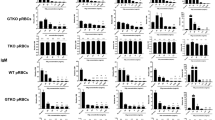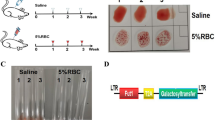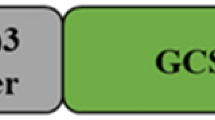Abstract
PURINOYL human serum albumin elicits in rabbits purine-specific antibodies which also cross-react with single-stranded deoxyribonucleic acid1. It seemed of interest to investigate the effect of this antigen on tumour-bearing animals.
This is a preview of subscription content, access via your institution
Access options
Subscribe to this journal
Receive 51 print issues and online access
$199.00 per year
only $3.90 per issue
Buy this article
- Purchase on Springer Link
- Instant access to full article PDF
Prices may be subject to local taxes which are calculated during checkout
Similar content being viewed by others
References
Butler, V. P., Beiser, S. M., Erlanger, B. F., Tanenbaum, S. W., Cohen, S., and Bendich, A., Proc. U.S. Nat. Acad. Sci., 48, 1597 (1962).
Ryser, H., Aub, J. C., and Caulfield, J. B., J. Cell. Biol., 15, 437 (1962).
Author information
Authors and Affiliations
Rights and permissions
About this article
Cite this article
SINAI, Y., LACHMAN, C. & COHEN, S. Effect of Purinoyl Human Serum Albumin on Transplanted Ehrlich Ascites Tumour in Mice. Nature 205, 192–193 (1965). https://doi.org/10.1038/205192a0
Published:
Issue Date:
DOI: https://doi.org/10.1038/205192a0
This article is cited by
-
Effect of anti-gmp antibodies on the growth of transformed cells
In Vitro Cellular & Developmental Biology - Animal (1995)
Comments
By submitting a comment you agree to abide by our Terms and Community Guidelines. If you find something abusive or that does not comply with our terms or guidelines please flag it as inappropriate.



